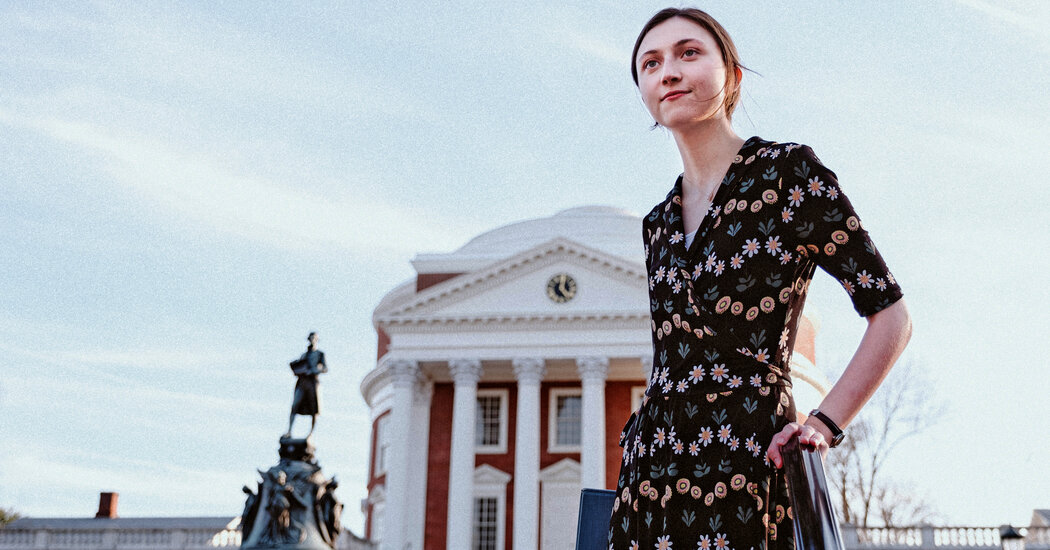Each week, I seek out the office hours of a philosophy department professor willing to discuss with me complex ethical questions raised by her course on gender and sexuality. We keep our voices lowered, as if someone might overhear us.
Hushed voices and anxious looks dictate so many conversations on campus at the University of Virginia, where I’m finishing up my senior year.
A friend lowers her voice to lament the ostracization of a student who said something well-meaning but mildly offensive during a student club’s diversity training. Another friend shuts his bedroom door when I mention a lecture defending Thomas Jefferson from contemporary criticism. His roommate might hear us, he explains.
I went to college to learn from my professors and peers. I welcomed an environment that champions intellectual diversity and rigorous disagreement. Instead, my college experience has been defined by strict ideological conformity. Students of all political persuasions hold back — in class discussions, in friendly conversations, on social media — from saying what we really think. Even as a liberal who has attended abortion rights protests and written about standing up to racism, I sometimes feel afraid to fully speak my mind.
In the classroom, backlash for unpopular opinions is so commonplace that many students have stopped voicing them, sometimes fearing lower grades if they don’t censor themselves. According to a 2021 survey administered by College Pulse of over 37,000 students at 159 colleges, 80 percent of students self-censor at least some of the time. Forty-eight percent of undergraduate students described themselves as “somewhat uncomfortable” or “very uncomfortable” with expressing their views on a controversial topic during classroom discussions. At U.V.A., 57 percent of those surveyed feel that way.
When a class discussion goes poorly for me, I can tell. During a feminist theory class in my sophomore year, I said that non-Indian women can criticize suttee, a historical practice of ritual suicide by Indian widows. This idea seems acceptable for academic discussion, but to many of my classmates, it was objectionable.
The room felt tense. I saw people shift in their seats. Someone got angry, and then everyone seemed to get angry. After the professor tried to move the discussion along, I still felt uneasy. I became a little less likely to speak up again and a little less trusting of my own thoughts.
I was shaken, but also determined to not silence myself. Still, the disdain of my fellow students stuck with me. I was a welcomed member of the group — and then I wasn’t.
Throughout that semester, I saw similar reactions in response to other students’ ideas. I heard fewer classmates speak up. Eventually, our discussions became monotonous echo chambers. Absent rich debate and rigor, we became mired in socially safe ideas.
Being criticized — even strongly — during a difficult discussion does not trouble me. We need more classrooms full of energetic debate, not fewer. But when criticism transforms into a public shaming, it stifles learning.
Professors have noticed a shift in their classrooms. Brad Wilcox, a U.V.A. sociology professor, told me that he believes that two factors have caused self-censorship’s pervasiveness. “First, students are afraid of being called out on social media by their peers,” he said. “Second, the dominant messages students hear from faculty, administrators and staff are progressive ones. So they feel an implicit pressure to conform to those messages in classroom and campus conversations and debates.”
The consequences for saying something outside the norm can be steep. I met Stephen Wiecek at our debate club. He’s an outgoing, formidable first-year debater who often stays after meetings to help clean up. He’s also conservative. At U.V.A., where only 9 percent of students surveyed described themselves as a “strong Republican” or “weak Republican,” that puts him in the minority.
He told me that he has often “straight-up lied” about his beliefs to avoid conflict. Sometimes it’s at a party, sometimes it’s at an a cappella rehearsal, sometimes it’s in the classroom. When politics comes up, “I just kind of go into survival mode,” he said. “I tense up a lot more, because I’ve got to think very carefully about how I word things. It’s very anxiety inducing.”
This anxiety affects not just conservatives. I spoke with Abby Sacks, a progressive fourth-year student. She said she experienced a “pile-on” during a class discussion about sexism in media. She disagreed with her professor, who she said called “Captain Marvel” a feminist film. Ms. Sacks commented that she felt the film emphasized the title character’s physical strength instead of her internal conflict and emotions. She said this seemed to frustrate her professor.
Her classmates noticed. “It was just a succession of people, one after each other, each vehemently disagreeing with me,” she told me.
Ms. Sacks felt overwhelmed. “Everyone adding on to each other kind of energized the room, like everyone wanted to be part of the group with the correct opinion,” she said. The experience, she said, “made me not want to go to class again.” While Ms. Sacks did continue to attend the class, she participated less frequently. She told me that she felt as if she had become invisible.
Other campuses also struggle with this. “Viewpoint diversity is no longer considered a sacred, core value in higher education,” Samuel Abrams, a politics professor at Sarah Lawrence College, told me. He felt this firsthand. In 2018, after he published an Opinion essay in The Times criticizing what he viewed as a lack of ideological diversity among university administrators, his office door was vandalized. Student protesters demanded his tenure be reviewed. While their attempts were unsuccessful, Dr. Abrams remains dissatisfied with fellow faculty members’ reactions. In response to the incident, only 27 faculty members signed a statement supporting free expression — less than 10 percent of the college’s faculty.
Dr. Abrams said the environment on today’s campuses differs from his undergraduate experience. He recalled late-night debates with fellow students that sometimes left him feeling “hurt” but led to “the ecstasy of having my mind opened up to new ideas.” He worries that self-censorship threatens this environment and argues that college administrations in particular “enforce and create a culture of obedience and fear that has chilled speech.”
The solution to self-censorship cannot merely be to encourage students to be more courageous. Is it brave to risk your social standing by saying something unpopular? Yes. Is it reasonable to ask college students — the 48 percent of us who feel uncomfortable sharing our views — to solve this problem independently? No.
And believe me, I’ve tried.
I protested a university policy about the size of signs allowed on dorm room doors by mounting a large sign of the First Amendment. It was removed by the university. In response, I worked with administrators to create a less restrictive policy. As a columnist for the university paper, I implored students to embrace free expression. In response, I lost friends and faced a Twitter pile-on. I have been brave. And yet, without support, the activism of a few students like me changes little.
Our universities cannot change our social interactions. But they can foster appreciation for ideological diversity in academic environments. Universities must do more than make public statements supporting free expression. We need a campus culture that prioritizes ideological diversity and strong policies that protect expression in the classroom.
Universities should refuse to cancel controversial speakers or cave to unreasonable student demands. They should encourage professors to reward intellectual diversity and nonconformism in classroom discussions. And most urgently, they should discard restrictive speech codes and bias response teams that pathologize ideological conflict.
We cannot experience the full benefits of a university education without having our ideas challenged, yet challenged in ways that allow us to grow. As Ms. Sacks told me, “We need to have conversations about these issues without punishing each other for our opinions.”
Emma Camp (@emmma_camp_) is a senior at the University of Virginia.
The Times is committed to publishing a diversity of letters to the editor. We’d like to hear what you think about this or any of our articles. Here are some tips. And here’s our email: letters@nytimes.com.
Follow The New York Times Opinion section on Facebook, Twitter (@NYTopinion) and Instagram.


























